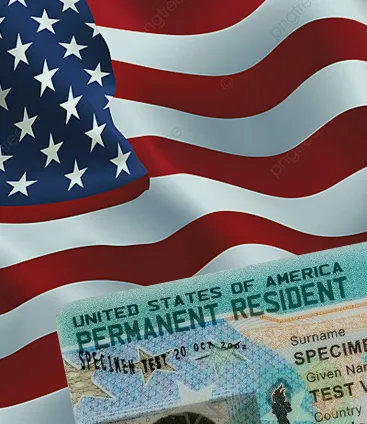MON – FRI (8am - 6pm)
The T visa adjustment of status is the process by which T visa holders can apply to become lawful permanent residents in the U.S. After meeting specific eligibility criteria, including holding the T visa for at least three years, assisting law enforcement with investigations, and maintaining good moral character.
This process enables victims to transition from temporary, nonimmigrant status under the T visa to a more secure, granting them permanent residency and the associated benefits in the U.S. Get in touch with us for experienced legal advice.


To qualify for T Visa Adjustment of Status from a T Visa to a Green Card, one of the key requirements is maintaining continuous physical presence in the U.S. for at least three years.
These 3 years start after receiving the T Visa. Alternatively, the applicant may also qualify if they have been present for a continuous period during the investigation or prosecution of the trafficking acts.
This requirement ensures that the applicant has established a meaningful connection to the U.S. and has contributed to ongoing efforts against trafficking. Documentation of this presence is essential, as any prolonged absence from the U.S. could potentially jeopardize eligibility for the adjustment of status.

In addition to maintaining continuous physical presence, T Visa holders must demonstrate good moral character throughout their time in the U.S. This means adhering to U.S. laws, avoiding criminal activity.
USCIS assesses moral character on a case-by-case basis, considering various factors such as criminal history, honesty in dealings, and overall conduct. Generally behaving in a way that aligns with societal norms is essential for T Visa Adjustment of Status.
Applicants must provide evidence of their good moral character, such as police clearance certificates and letters of recommendation, which play a crucial role in the evaluation process. Establishing good moral character is a critical component in successfully adjusting status.
A T Visa holder’s criminal history can significantly impact their T Visa Adjustment of Status application. USCIS conducts a thorough review of any criminal records to determine eligibility. Certain crimes can disqualify an applicant.
In some instances, T Visa holders with a criminal history may still be eligible for the adjustment of status if they can obtain a waiver of inadmissibility. The waiver application must be supported with documentation.
USCIS may grant such waivers if the applicant can demonstrate that their criminal activity was directly related to being trafficked, including evidence of rehabilitation and testimonials from community members or professionals. Legal assistance is crucial in preparing and submitting a strong waiver application.

Legal representation is crucial for T Visa holders navigating the complex process of T Visa Adjustment of Status. Immigration law is intricate, and the stakes are high for those seeking permanent residency. Experienced attorneys can help applicants understand the requirements, gather necessary documentation, and prepare for any potential challenges.
They provide invaluable support in ensuring that all forms are completed accurately and that the applicant is fully prepared for any interviews or additional requests for evidence. For legal expertise, connect with Serving Immigrants today.
Below is a detailed explanation of how the reunification of family members of a T Visa holder works, who must meet certain requirements.
T Visa holders have the opportunity to apply for derivative visas for eligible family members, allowing them to join the primary applicant in the U.S. Family members who may qualify include spouses, children under 21, parents, and unmarried siblings under 18, depending on the age and circumstances. Family members may also be included in the T Visa Adjustment of Status process.
The process for applying for derivative family members involves submitting Form I-914 Supplement A, along with supporting documentation that proves the family relationship, such as birth certificates or marriage licenses.
If the family members are outside the U.S., they may need to undergo consular processing at a U.S. embassy or consulate in their home country. It is essential to ensure that all documentation is complete and accurate.

Below is a description of each of the most important steps for T Visa adjustment of status.
Before applying for the adjustment of status, T Visa holders must ensure they meet the eligibility criteria. This includes maintaining continuous physical presence in the U.S. for at least three years after receiving the T Visa.
Applicants must collect proof of continuous physical presence that demonstrates they have been residing in the U.S. for the required period. Evidence of good moral character can include police clearance certificates. Additionally, applicants should gather any documents that demonstrate their cooperation with law enforcement for the T Visa Adjustment of Status.
Form I-485 requires detailed personal information, including the applicant’s immigration history, physical presence in the U.S., and any criminal history. It’s crucial to ensure that all information provided on the form is accurate. See how Form I-485 looks.
Applicants must pay the applicable filing fees when submitting Form I-485, or they can request a fee waiver. The filing fee for Form I-485 is standard unless the applicant is applying for a fee waiver due to financial hardship during the adjustment of status process. To calculate your fee, click here.
Once the form is completed, documents are gathered, and fees are paid or waived, the entire application package must be submitted to USCIS. It is important to double-check that all forms are signed and all supporting documents are included.
After submitting the application, USCIS will schedule a biometrics appointment where the applicant will provide fingerprints, a photograph, and a signature. The appointment notice will include the date, time, and location for the biometrics appointment for T Visa Adjustment of Status.
Applicants should prepare thoroughly for this interview, as it is an opportunity to clarify any details and demonstrate their eligibility in person. It’s essential to bring all required documents, including the appointment notice, identification, and any additional evidence that may be relevant to the case. The help of an attorney is important for preparing a solid interview and more, contact us right now.
If the application is approved, USCIS will issue a Green Card, granting the applicant lawful permanent resident status. If there are any errors, the applicant should contact USCIS immediately to request a correction. The Green Card is typically valid for 10 years and must be renewed before it expires following the T Visa Adjustment of Status.
Explore the most frequently asked questions about t visa adjustment of status:
After maintaining lawful permanent resident status for five years, the holder can apply for U.S. citizenship through naturalization after you have gotten your green card.
Yes, applicants are typically required to attend an interview where a USCIS officer will review the application and verify the provided information. Find out more Interview Guidelines by clicking here.
It is the process through which T Visa holders can apply for lawful permanent residency (Green Card) after meeting specific requirements. To explore further about the transition from T visa to Green card, click here.
Proof of continuous physical presence, good moral character, and cooperation with authorities are required, along with Form I-485 and supporting documents.